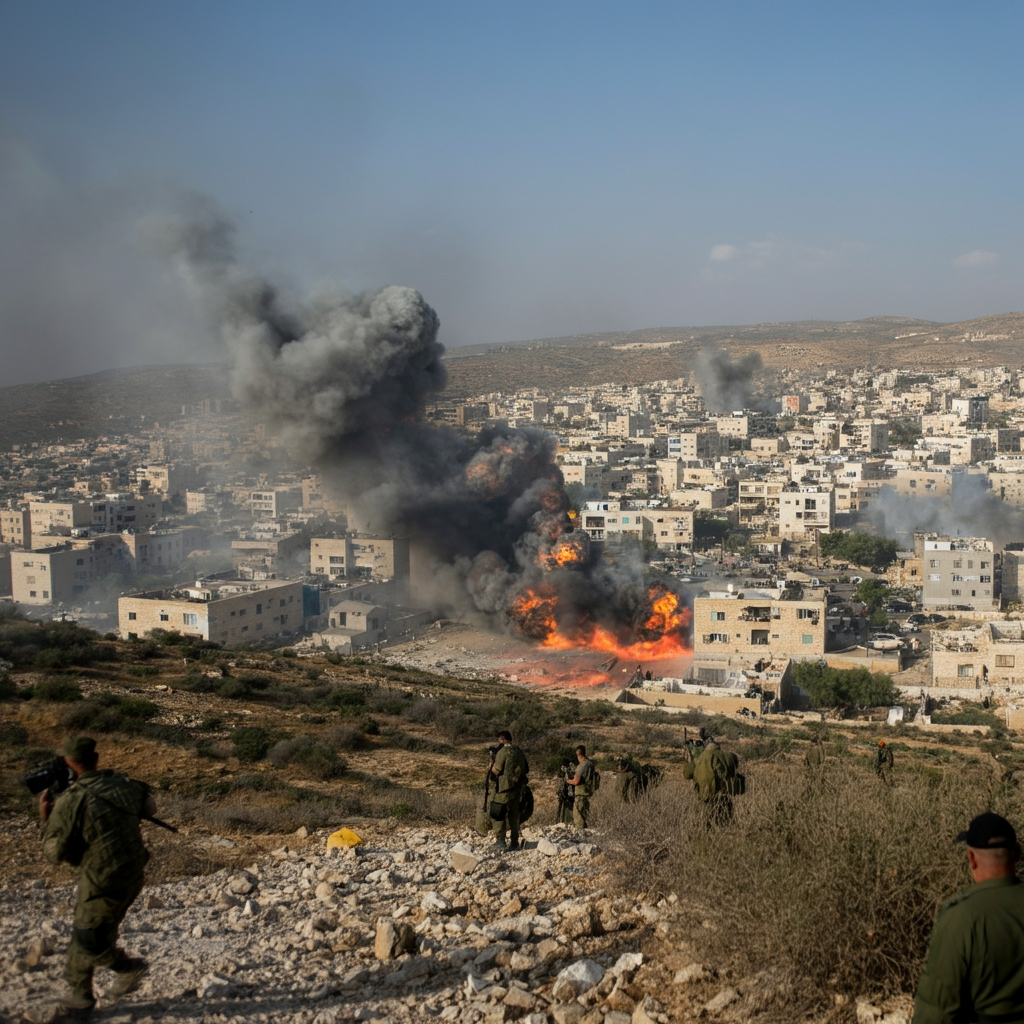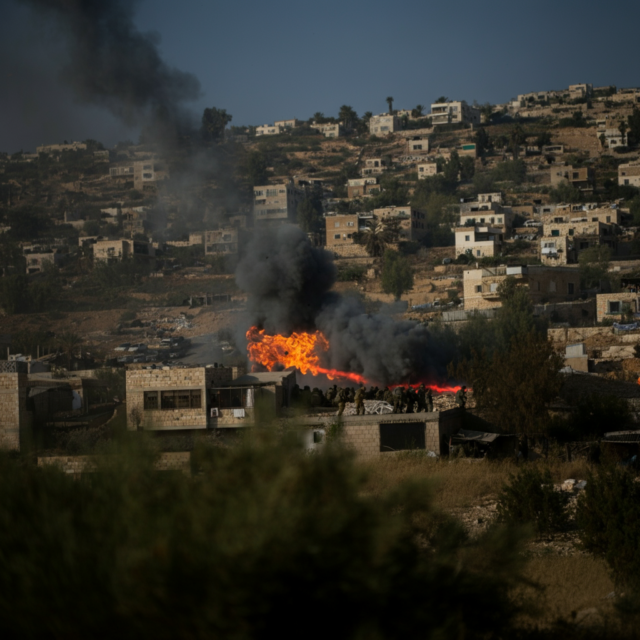The long-standing battle between Israel’s newest assault on Palestine — a perpetual crisis has erupted again with overwhelming implications for innocent civilians and buildings within many parts of Gaza why hope against hope can be grappled with conditions like what we are witnessing now. In recent days the aerial bombardment and ground activity by Israel has escalated into a humanitarian disaster.
Current Hostilities
The recent surge in violence erupted after a flimsy truce fell apart earlier this month. Israeli forces carried out extensive airstrikes across Gaza, killing at least 414 Palestinians in one night, including 174 children, according to reports. Hospitals in Gaza are overwhelmed, desperately working to care for more than 550 casualties — they are so packed with patients that some medical facilities are forced to render help in hallways and courtyards, lacking room and equipment to do so properly.
Al-Ahli Arab Baptist Hospital, the only operating intensive-care unit, has been overwhelmed, and the Al-Shifa Hospital, the once-largely facility in Gaza, is nearly incapacitated. Also worsening the humanitarian situation is the destruction of Gaza’s only specialty cancer hospital, which was demolished in an Israeli airstrike earlier this week. The Israeli Defense Forces (IDF) have defended these assaults as aimed at Hamas’s “terror infrastructure,” but the toll on civilian lives and vital services has been staggering.
Increased Aggressions and Ground Operations
Israeli ground forces have also entered the fray, advancing into parts of northern and southern Gaza. Entire neighborhoods have been leveled, and residents have complained of evacuations ordered with no or little warning. Locally, these ground operations have spread to areas never during military occupation, given many feared permanent annexation as new territories were being seized by the IDF. Palestinians in Gaza describe scenes of chaos and terror amid the spike in displacement and increasingly limited access to basic needs, including food, water and electricity.
The new fighting also takes aim beyond Gaza. Israeli forces notably hit southern Lebanon in retaliation eight rockets fired by the Iranian-backed group Hezbollah, a dangerous regional spillover to the conflict. Simultaneous missiles launched from Yemen by Houthi rebels, intercepted by Israeli air defense systems, further suggest a precarious geopolitical environment.
The Civilian Toll and Humanitarian Crisis
Gaza is suffering a humanitarian catastrophe. And with Israel enforcing a full blockade since earlier this month, the flow of humanitarian aid — food, medicine and other desperately need supplies — has been completely severe. There’s no real electricity, so people can’t power medical equipment or desalinate water. United Nations officials and international humanitarian organizations have warn that urgent supplies of key items, including flour for bread, could be exhaust within days, putting Gaza on the brink of even greater suffering.
Amnesty International also condemned Israel’s latest actions as “genocidal” and urged the international community to take swift action. The organization made dire warnings about the collapsing healthcare system, calling it a “death sentence” for many of those wounded or suffering from illness.
Responses from the Political Left and Right
Benjamin Netanyahu, Israel’s prime minister, has pushed for a hard-line response, vowing to step up military action until Hamas frees all Israeli hostages. Netanyahu has portrayed the recent violence as a necessary counterterrorism operation, though he faces growing criticism at home of his government’s management of the crisis. These steps have split public opinion among Israelis, as protests against the government’s policies have surged. The Supreme Court of Israel, unlike most democratic systems of government, is not an unusual place for a challenge to a government, but one recent ruling — freezing the move to dismiss the head of Shin Bet (Israel Security Agency) — signaled the extent of domestic divisions over how the government has handled security matters.
In the meantime, Hamas has kept firing back, launching rockets toward Tel Aviv and other parts of Israel. The group has demonstrated its teachers to sustain heavy losses while retaining its operational capacity, complicating matters further. Palestinian authorities and organizations have denounced Israel’s actions as collective punishment, and they noted the systematic weakening of civilian infrastructure as a way to shatter Palestinian autonomy.
International Reactions
The unfolding tragedy has drawn mixed responses from around the world. The United Nations called the situation “horrifying,” and Secretary-General António Guterres has urged an end to fighting and to humanitarian aid to Gaza without delay. Many Western countries, including the United States, have generally repeated statements of support for Israel’s right to defend itself against Hamas, while stopping short of directly calling for an end to the fighting or avoiding more specific calls to protect civilians, as some European nations have done.
Arab officials have firmly expressed solidarity with Palestinians, with some states calling emergency meetings to address the situation. Instead of a blockade, Egypt’s President Abdel Fattah el-Sisi spearheaded calls for an Arab League intervention, but the absence of action has left many observers infuriated. The humanitarian crisis has prompted humanitarian organizations to call on states to pressure Israel to comply with international laws and allow aid organizations to enter Gaza.
The Challenges of a Ceasefire
A permanent ceasefire appears far out of reach, given the longstanding mistrust between the two sides and the solidifying of their positions. Israel has said fighting will continue until Hamas is disarm and all hostages freed. But Hamas and other Palestinian factions insist on an end to the siege and Israeli attacks as conditions for any cease-fire. The collapse in confidence, compounded by the failure of international actors to facilitate meaningful dialogue, has left the region primed for further escalations.
Complicating things is the larger geopolitical landscape. Iran’s alleged backing of Hamas, as well as the participation of other regional actors such as Hezbollah and Houthi rebels, has raised fears of a broader conflict engulfing the Middle East. This has raise fears that any potential resolution in Gaza might be undercut by simmering tensions throughout the region.
The Long-term Implications
The latest violence highlights the harsh realities of the Israel-Palestine conflict, now in its 75th year. The widespread destruction of Gaza’s infrastructure — including hospitals, schools and power facilities — not only compounds the humanitarian tragedy but also endangers the long-term prospects for peace and stability. The repeated targeting of refugees and displaced people, what some analysts have described as ethnic cleansing, has raised doubts about Israel’s endgame in Gaza.
For Palestinians themselves, the crisis exposes immediate survival challenges as well as a more existential sense of disenfranchisement and loss of hope for a state of their own. For Israelis, this war is the latest chapter in decades of insecurity and fear, with deep scars on the country’s political and social fabric.
Cross-border, a pattern has emerged of global powers failing to intervene meaningfully, and the chronic impasse that has characterized efforts by world powers to negotiate in the region. Without sustained pressure and intervention from the global community, the cycle will continue, resulting in yet more bloodshed and the intensifying of one of the world’s longest-running and worst conflicts.

A Path Forward?
This is no time for anything but humanitarian relief. Organizations and countries need to mobilize to make sure supplies are deliver to Gaza, even as the fighting goes on. At the same time, the international community needs to demand a cease-fire that has enforceable mechanisms to avoid future flare-ups.
More generally, to solve the root causes of this conflict we need a long-term commitment to equitable solutions. Moving from rhetoric to action What is need over the next year is to move from words to action on international acceptance of a two-state solution as the only way forward. Israel’s newest assault on Palestine — a perpetual crisis leadership alike — as well as regional and global actors — have to address the historical injustices and current grievances that are creating this conflict.
Until then, the slaughter that issues daily from Gaza and Israel will remind the world of the price of inaction; of the costs of negligence, greed and fear.








